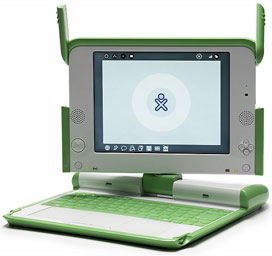Asus, Acer, HP, Lenovo - it seems everybody's trying to play the
tablet game now. So far, Apple's iPad is
way ahead of the competition. Nobody seems to understand the iPad's
ingenious combination of features, though the latest Android-based
concepts sound closer to the mark.
The fact is, the iPad is aimed at a market that wants to move - and
be productive (or entertained) while doing it.
The biggest flaw of the wave of new tablet prototypes is that they
just don't have the battery life or the ubiquitous standards to match
the iPad. Nor are they designed to be as long-legged as the iPad; Apple
clearly has a well-defined roadmap for the iPad, while all these hack
tablets are just interim products to fill in a void their manufacturers
did not anticipate.
They're not going to hold.

The OLPC XO-1
I find it ironic that the device that stands to compete most with
the iPad might not even have to face off against it in the same market.
Anybody remember One Laptop Per
Child XO-1?
You know, the quaint little laptop that kind of started the netbook
fad?
Well, the roadmap for OLPC calls for a device known as the XO-31,
a thin, flexible tablet to be available by 2012. And they're working on
it, too.
Compared to such cut-and-paste solutions as the new Windows 7
MSi Slatebook tablet or the Linux-based JooJoo, the XO-3 is a completely
revolutionary design. It's gotta be tough, light, cheap, and capable.
It has to have a long battery life. It must withstand the rigors of use
by children in developing countries.
Obviously, if and when this thing becomes a reality, it is going to
be a tablet to end all tablets.
The designers aren't even thinking about competing with the iPad.
They're designing it for villages and slums, not for WiFi-saturated San
Francisco, Chicago, or New York. Odds are that the XO-1's Wireless
Distribution System (WDS) capabilities will come into play here,
providing wireless to the XO-3 as well as to its fellow XO-1s.
Personally, I'd love to be involved in a project like that -
creating kid-friendly laptops and tablets that can survive in harsh
environments, share the Internet as a common resource for education
(not for watching a cat fall off a pool table on YouTube), and share
useful communications and technologies with countries that have
previously had none. It's creating a technological masterpiece to get
back to the basics of life.
Nonetheless, its technology will no doubt spawn a wave of imitators,
all targeted at the Web-gluttons of the developed world. Lower battery
life, superfluously complex display and entertainment technology, and
low-endurance designs will result, all at a higher price tag. Asus,
Acer, HP, Lenovo, and others will all profit tremendously.
I don't see Apple being an imitator. They've always been innovators,
and I'm sure the iPad is just the beginning of a new personal computer
revolution. 
Austin Leeds is a Mac and iPad user - and a college student in Iowa.



